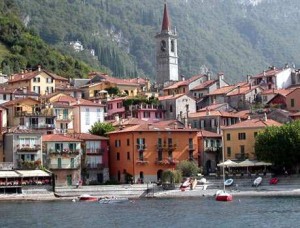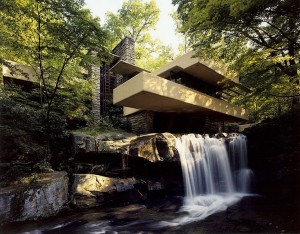In their paper ‘Being Here – Attitude, Place and Design for Sustainability’ presented at the Allemandi Conference Craig Badke and Stuart Walker discuss the the difference between ‘having’ and ‘being’ for sustainable design.
In these two examples, the historic town of Verrena on Lake Como and Frank Lloyd Wright’s modern organic masterpiece ‘Fallingwater’, architecture and nature exist in a symbiotic relationship. Both respond to topography and stunning natural settings creating a strong sense of place. Note in both instances the use of outdoor terraces and potted plants to create transitional public/private spaces between the indoors and outdoors.
Having which implies ‘possession’ to some extent; depends on the ability to control of something external to oneself, whilst being rather suggests the ‘enjoyment’ of what is present to oneself without the need to possess it. It enables the person to exist in radical freedom in relationship to the environment; not to exploit the environment but to harmonise with it.
Surely it is possible to promote such an approach to our urban environments?



It is a thousand pities that modern architecture did not take more from Frank Lloyd Wright and less from the other Pioneers, because Wright was always interested in context-sensitive design and the others only occasionally.
an interesting experiment in urban planning would be to design the landscape first and then have the buildings fit in around it. when it comes to combining buildings with nature, the artist Hundertwassers architecture is well worth looking at.
I’m not against designing the landscape first; although usually the ‘design problem/solution’ will suggest quite logically which (landscape/architecture) should come first. A Botanic garden gives priority naturally enough to the garden, as does a park, an eco-tourism facility etc. Hundertwasser’s architecture is ‘Disneyish’: not sure what you see of value in it?
if we really want green cities, not just cities with a bit of nature tacked on, then the landscape around and within them has to be given at least equal consideration.
i find hunterwassers buildings very joyful and expansive, and a welcome antidote to the po faced sterility of most modern architecture. thats just imo of course. i know a lot of architects can’t stand him – perhaps that amuses me too! he has some very funny and very clever things to say.
if we really want green cities, not just cities with a bit of nature tacked on, then the landscape in and around the city has to be given at least equal conseideration.
i find hunterwassers architecture very joyful and expansive, and a welcome antidote to the po faced sterility of much modern architecture. he also has some clever and funny things to say.
if i can, theres a good quote by him on my blog here;
http://shorterwater.blogspot.com/2008/10/in-pub-last-night-desided-we-were-part.html
I have been to Bad Blumau http://www.gardenvisit.com/garden/bad_blumau_rolling_hills_landscape and, like most of the visitors so far as I could judge, loved it. The circulation system is a particular success. Cars drive and park under the buildings. Grass-roofed passages connect the buildings. Visitors put on swimsuits and dressing gowns when they get out of bed, then dip in the spa waters and go for breakfast. The architecture is a tad whimsical, but so are folk.
6. Stefan I get more joy from that beautiful little beach hut…and if it was mine I would not wrap it entirely…but allow the wrapping to reflect its position in the landscape, orientation etc.
sounds like i’ll have to make a pilgrimage to Austria!
and i’m glad you like the hut Christine, thank you very much!